Haints Stay (24 page)
Authors: Colin Winnette

“It's nice,” said Brooke.
“But not for us,” she answered.
The piano took up nearly a quarter of the shared space. She played
beautifully. Brooke had never heard anything like it. It was not like bar music, or
the upbeat steps you might hear in a brothel. She lingered the notes, let them ring
out. She sang softly, songs he did not know. He kept his distance. She was growing
confident in her confusion. She called him John and every time the smirk she wore
softened. Soon, she called him John as if it were the name she'd always known him
by. They lived together more as brother and sister than man and wife, but they had
an affectionate air about them that gave their neighbors no question. Slowly, they
began to cultivate the land that extended beyond their home. Brooke dug irrigation
ditches and planted seeds he found in an abandoned shop near the center of town.
They offered a percentage of their yield to Wendell in exchange for the first calf
born from his livestock. Brooke also offered to work for him throughout the
reconstruction of most of the buildings, or the destruction of those that were too
far gone. They actively traded and dealt with the family, but they were less social
here than they had been even while wagon training. Occasionally, Marston dropped by
and spoke with Brooke. Marston was planning to open the store. He would get a line
on products from the nearest city, an address for which he had dis
covered amongst the old mail that was clogging the cubby holes in the abandoned
post office.
“It is as if we had stumbled into Paradise,” said Marston.
They were seated in two of the four chairs claimed by Brooke and the
woman he met in the snow, who had taken to calling herself Mary.
“And what if the good people of Wolf Creek return ?” said Brooke.
“Wolf Creek is no more,” said Marston, “for we are in Wendell's
Valley.”
They began to brew and grow and cattle were born. In not much time at
all, each had fallen into step with a private life of sorts. Wendell and Irene
occupied a home by the church, and led sermons and sing-alongs from the pulpit every
Sunday. Marston, Jack, and Clay attended these weekly gatherings with the three
younger women, Wendell's confidante, the slanted-speaker, and the girl who had been
in the back of the wagon with Mary when she was ill. These women were named Clara,
Dorothy, and Caroline, respectively. Clara, it turned out, was Marston's wife.
Formally, at least. She seemed closer to his father, and achieved most of her ends
by going through Wendell, rather than Marston. Caroline and Dorothy were sisters to
Marston, Jack, and Clay, and Caroline was the youngest of the lot. They sat in the
front pew together at the church, and every so often, Brooke and Mary would seat
themselves in the back row to watch the proceedings, if only for the company.
They planted a sign at either end of the town, one facing the desert and
the other facing the path that led in from the woods.
One night, Brooke and Mary were on the porch, just watching the sky. It
was spectacularly plain. The clouds moved along at varying speeds. It was otherwise
a constant shade of blue.
“Could you ever have imagined our lives would one day
look like this ?” said Brooke.
“I am not so sure what you imagine our life looks like,” said Mary. “When
I look, I hardly see anything at all.”
They were quiet then. It was warm out. Mary had boiled the water for
Brooke's bath, and it was cooling in the tub toward the back of the house. Their
arms were still, perched on the rests their chairs provided. Flies worked a bit of
manure just past the fence. A faint funnel of smoke lifted from the chimney of the
cafe. A man came to town.
Bird did not sleep that night at the fountain. He slowly sobered
and realized that he was cold and shivering. He warmed himself with his hand where
he could. When the sun rose, he wandered back to the staircase and stood before it.
He could not wrap his mind around it, and found it incredibly inspirational. It was
beautifully crafted and solitary. It was hopeful and grand. He returned to the
mission and found it quiet and still. He wandered the halls and saw no one. He left
and walked to the adjacent building, in front of which stood a large man in a vest.
It was a bathhouse, open to the public, explained the man. But it was not cheap.
“I am looking for the boss,” said Bird.
“Are you looking for trouble ?” said the man.
“No,” said Bird. “I would like to offer my services as a gunfighter.”
“You are a cripple,” said the man.
“No, I am not,” said Bird.
“You'll have to leave your gun at the desk,” explained the man. He was
smiling. Bird did not like the expression.
“I have killed one hundred men,” said Bird. “I was in the
army.”
“You are a very brave boy,” said the man.
“Do you know Ramon ?” said Bird.
The man smiled. “I know him very well,” he said. “I am his
cousin. We work together. Do you⦠know Ramon ?”
“We met last night,” said Bird.
The man laughed then and said the boss would be more than
happy to meet a friend of Ramon's.
The boss was a tiny man behind an enormous desk.
“You hope to be a gunfighter ?” he said.
Bird was seated in a chair on the opposite side of the desk.
The chair was appropriately enormous to match the desk before
it. It seemed to swallow Bird as the boss's chair swallowed him.
“I am a gunfighter,” said Bird. “I hope to find work. I have a
wife and need a home.”
“Our men live in the mission,” said the boss. “Where is your
wife ?”
“I do not know,” said Bird.
The boss smiled then.
“I see,” he said. “You are friends with Ramon ?”
Bird nodded.
“Ramon is a good man, and he is trouble.” He had tiny eyes,
the small boss behind the desk. They were focused, but there
was nothing cruel in it.
A hand set upon Bird's good shoulder and he turned to meet
the gaze of a considerable man in a top hat.
“Would you like a drink ?” said the man. “You have the look
of someone who has been out late with Ramon.” He smiled.
“Yes,” said Bird. “Something that does not sting, though.”
“You are eyeing my hat,” said the man.
Bird looked away.
“It's yours.” The man placed the hat atop Bird's head.
“It suits you,” said the boss. “Where were we ?”
“I cannot honestly say,” said Bird, fussing with the hat now.
“I am not confident in my standing with you.”
The boss laughed. “Nor should you be. If you come to work
for me, you will only be as good as your last completed job. I do
not carry much love for killers and fighters. I abhor violence and
its necessity. Otherwise I would not need a mission of killers at
my disposal. I am not so bad with a gun myself. Do you have
terms ?”
“I have taken two hundred per man, in the past,” said Bird.
“Oh,” smiled the boss. “Two hundred it is, then.”
“And I want to know why you assign the targets you do,” said
Bird.
“You will not always like why. Sometimes, it is best not to
know.”
“I want to know. And I want the option to select who I go
after. If you have a mission of killers at your disposal, each job
will surely get done, regardless of my being the one you'd like
to do it.”
“You do not make a strong case for yourself as an individual,” said the boss. “But I like a man with reasonable terms. And
I like your new hat. And I like Ramon, though he is trouble.”
“I would like only to pursue evil men, who have done considerable wrong,” said Bird.
“There is no shortage of them, my friend,” said the boss.
He reached into a drawer at his knee and withdrew a stack of
papers. “These are posters with deeds detailed. You'll see no
man among them who does not deserve justice. In truth, the list
is endless, the pages infinite, but these are the particular ones I
have some personal interest in seeing brought to ruin.”
Bird was quiet for some time. He leafed through the pages.
He was soon met with his drink.
“The hat looks excellent,” said the man who'd set the glass
before him.
Bird drank. He turned page after page. The faces of these
men and women were not so different, one to the next. Or their
likenesses were poorly reproduced by a limited hand.
“These two men,” he said, finally. He held up a deedless poster for two brothers, neither of whom wore a hat. “What is their
full list of deeds, and what is your personal interest in them ?”
“Those men are trouble,” said the boss. “They are wanted
in nearly every town for some reason or another, but they are
not flashy or particularly skilled. Their crimes are many. Too
many wrongs to list. A lifetime of wrongdoing. But they are not
impressive enough for any kind of serious pursuit. They are not
high profile. But, for me, it's a personal matter. They broke my
man's nose.” He gestured to the considerable man still perched
behind them.
Upon closer inspection, Bird realized that he was, indeed,
disfigured.
“They caused a ruckus in my bath. They brawled and drank
and sought to wreck the peace. So I'll see them answer for their
crimes. The news is that they have been apprehended, though.
For a town they razed as mere boys. They were separated and
brought to undisclosed locations. I have learned the where-abouts of one, though only through rumors in the street. This
one,” the boss put a finger to Sugar's likeness, “was set to bear
a child. Left to their own devices, people will live out every possible variation of a human life. They are not at the top of my list,
but if you can apprehend one or the other, I will pay you your
two hundred. If that is where your interest lies.”
“That is where my interest lies,” said Bird. He examined the
poster. Life was not at all what he expected, yet he was faced
now with all he had ever known to hope for. “If they are already
apprehended, is the case not cared for ?”
“My man would like some time with them,” said the boss.
“What kind of boss would I be if I did not care for the desires
of my men ?”
“I would like to find them,” said Bird.
“You seem excited,” said the boss.
“I am ready, is all,” said Bird.
They drank on it. He bathed. They clothed and armed him.
They provided a holster and an uncracked belt. They provided a
horse, which was fed and shod and roped to a post on the edge
of town.
Bird found Ramon at the staircase, smoking.
“You are quick,” said Ramon.
“There is work to do,” said Bird.
“There is always more of that kind of work,” said Ramon.
“We did not expect to hold this place as long as we have. We
have made a lot of enemies. Do you still like me just a little ?”
“I like you, Ramon,” said Bird.
“We are friends ?”
“You are my first real friend,” said Bird.
“Will you smoke with me ?” said Ramon.
“Will you show me ?” said Bird.
Ramon lit a cigar for Bird and told him to hold the smoke in
his mouth, but not to take it into his lungs.
“You'll feel light-headed,” said Ramon, “and then you will
feel a great charge. It is good for riding. The time passes more
quickly.”
“How long is the ride to Wolf Creek ?”
“A day or two. You will find it pleasant.”
“I had never killed a man before,” said Bird. “Before we met
in the street.”
“I know,” said Ramon.
“How ?”
“You are eager in the way a killer is not. You are anxious too.”
“Everybody likes you here, Ramon,” said Bird.
“Really ?”
“Knowing you got me in the door.”
“That is nice to hear,” said Ramon.
“Are you a killer, Ramon ?”
“Yes,” he said.
They were seated on the third step of the winding staircase.
Ramon's knee tilted to meet with Bird's.
“Where did this come from ?” said Bird. He took the cigar
between his teeth and touched the beak of the wooden eagle.
“Someone carved it,” said Ramon.
“But the stairs,” said Bird.
Ramon shrugged. “Someone built them.”
“But why are they here ?” said Bird.
“They are nice to look at,” said Ramon. “And no one tore
them down.” Ramon rose. “I cannot smoke a whole one of
these in one sitting, and neither should you, little bird. Besides,
you've got the day to ride and a man to catch. You had better get
going, so you can hurry back.”
“We could drink when I get back,” said Bird.
“We will,” said Ramon.
Bird rose, and they embraced. Ramon led him to the edge of
town, where the new horse was tied and waiting. He watched
Bird remove the ropes and set the saddle. He waved to Ramon,
who nodded back and turned away. Bird stubbed his cigar then,
and lit out for territory.
Thanks, as always, to Andi — for everything. Thanks
to Daniel Levin Becker and Eli Horowitz. Thanks to Charlotte Sheedy, Sam Lipsyte,
Saeed Jones, Amelia Gray, Lindsay Hunter, Karolina Waclawiak, and Brian Evenson.
Thanks to Dan McKinley and Jen Gann, for your horse sense. Thanks to Julie, Miles,
Katie, Adam and the Mudds. Thanks to Eliza Wood-Obenauf and Eric Obenauf, and to
everyone at Two Dollar Radio.

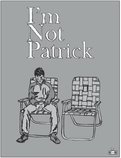
O
n an overcast Wednesday
afternoon, Patrick N. Allen took his own life. He is survived by his father,
Patrick, Sr.; his stepmother, Patricia ; his step-sister, Patty ; and his twin
brother, Seth.
Coming 2015
Written & Directed by Eric Obenauf
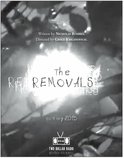
P
art-thriller, part-nightmarish
examination of the widening gap between originality and technology, told with
remarkable precision. Haunting and engaging,
The Removals
imagines where we
go from here.
Coming 2016
Written & Directed by Nicholas Rombes

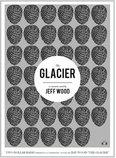
THE GLACIER
A CINEMATIC NOVEL BY JEFF WOOD
COMING SEPTEMBER 2015
A spellbinding work of fiction that re-imagines the American
frontier of the late-nineties and early-aughts, a time when cookie-cutter
developments stamped the countryside beige. Following a caterer at a convention
center, a surveyor residing in a storage unit, and the dazed and death-obsessed
denizens of the burbs,
The Glacier
is a poetic rendering of the
pre-apocalypse.
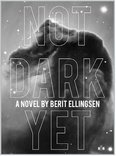
NOT DARK YET
A NOVEL BY BERIT ELLINGSEN
COMING NOVEMBER 2015
“[Ellingsen] is just starting what promises to be a major career,
but already giving readers a unique and fascinating perspective.”
— Jeff VanderMeer
Brandon leaves his boyfriend in the city for life in the mountains
after an affair with a professor ends with Brandon killing a research animal. His
new neighbors are staging an ambitious agricultural project thanks to changes in the
climate, and Brandon gets swept along with their plans. However, he learns that
these changes — internal, external — are irreversible.
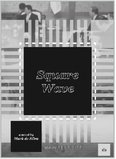
SQUARE WAVE
A NOVEL BY MARK DE SILVA
COMING FEBRUAR
Y
2016
Stagg is a historian researching imperial influence in 17th century
Sri Lanka, who makes a living as a watchman in a factionalized America. When beaten
prostitutes begin appearing, Stagg partners with Ravan, whose family studies weather
modification. Their discoveries put a troubling complexion on Stagg’s research, just
as the weather modification project looks less about dispersing storms than
weaponizing them.
Square Wave
signals the triumphant arrival of a young writer
certain to be considered one of the most ambitious and intelligent of his
generation.


THE ONLY ONES
A NOVEL BY CAROLA DIBBELL
“Breathtaking. It’s that good, and that important, and that
heartbreakingly beautiful.” — NPR
“Fascinating… A heart-piercing tale of love, desire and
acceptance.”
—
Washington Post

BINARY STAR
A NOVEL BY SARAH GERARD
“The particular genius of
Binary Star
is that out of such
grim material in constructs beauty.” —
New York Times Book Review
“Rhythmic, hallucinatory, yet vivid as crystal… sings to the lonely
gravity of the human body.” — NPR

THE ABSOLUTION OF ROBERTO ACESTES LAING
